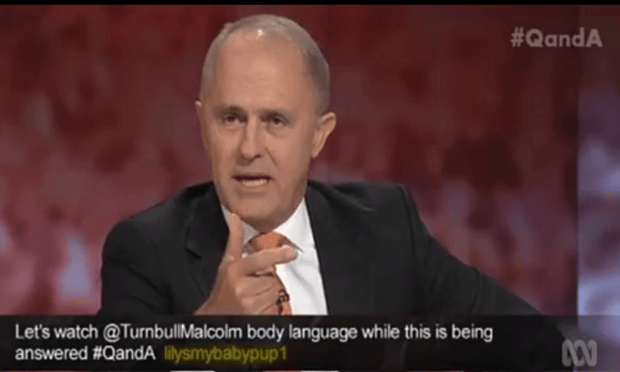
Lenore Taylor, political editor Friday 20 February 2015
Slogans and branding strategies are good at getting parties noticed, and even elected, but the gloss of the sales pitch quickly fades if not backed up by decent policies and sane political process
Malcolm Turnbull’s on Q&A: ‘What we, as politicians, have to do is treat the people with respect. Don’t slogan at them. Don’t pretend problems don’t exist. Lay out the problems.’ Photograph: ABC
Marketing manuals advise would-be salespeople to use the word “value” rather than “price” because it implies customers are getting something worthwhile rather than losing something, like money. Presumably we get so dazzled by the promised qualities of what we are about to buy we forget that we’ll have to pay for it.
Since we’ve been fed for years the depleting idea that political parties are like “brands”, it’s probably no surprise that the same slick linguistic tricks are inveigling their way into politicians’ language.
As we noted two weeks ago, the new health minister Sussan Ley says part of the problem with the GP co-payment policy was the very word “co-payment”, which was seen by the public as a “dirty word”. The minister, who seems to be doing her best to find her way through a somewhat confused policy brief, says she won’t even call it a “price signal” any more, but rather a “value signal” because that meant we “value the services our GPs provide”. (It is unclear how this reassuring message fits with the somewhat alarming image of Ley donning a single rubber glove on the front page of this weekend’s Australian magazine, even if it is good to know she has a sense of humour.)
When choosing between products, emotive words and images might change people’s minds. Who knows, maybe some parents do think a particular brand of washing powder will produce results so dazzling that teenage children will be happy and grateful for their laundering efforts. Maybe some coffee drinkers think a certain brand really might be so delicious it would override their interest in meeting George Clooney. But surely if these possibly delusional thoughts drove them to buy the washing powder or the coffee and it turned out to be no good, they wouldn’t buy it again, unless of course they couldn’t find a better alternative.
Which brings us directly back to Australian politics. Emotive words, slogans and branding strategies are getting political parties noticed, even elected. But judged against the reality of what came later, “Can Do” Campbell, “New leadership” Kevin and “Real Action” Tony were disappointing, to say the least. The snappy slogan quickly fades if it isn’t followed by decent policies and sane political process. Even reasonable aims, debatable propositions or good ideas get warped and confused by the positioning and the sales pitch.
Having failed to pass last year’s budget and having not yet settled on a clear direction for this year’s, the government is now going back to the drawing board with an advertising campaign, based on the soon-to-be-released intergenerational report, explaining why it felt it needed to either reduce spending or increase tax in the first place.
But when actual ideas for possible cuts (extending the pension assets test to the family home) or revenue-raising (changes to the GST) wriggle out into the public debate, they are squashed almost immediately. And it’s hard to advertise the problem at the same time as the policy “solutions” offered in last year’s budget (which Joe Hockey says are the only way we’ll ever get to a surplus again, even though some of them aren’t even directed to the budget bottom line) have already failed and appear likely to be abandoned.
Meanwhile Labor, while promising a bright new future of policy transparency sometime in the future, continues to oppose pretty much everything. So far it’s followed the same script, the same cynical small-target strategy by which Tony beat Julia, Annastacia beat Campbell – shallow victories based on the opposition being less unpalatable or threatening than the government of the day.
The government is now opening a new debate about childcare, based on recommendations in the final report by the Productivity Commission that should be the basis for very sensible policy changes. Social services minister Scott Morrison has said, not unreasonably, that he would like to work with Labor on the response. But he’s also said that Labor will have to agree to offsetting savings before he can offer extra money to reduce the number of families losing out under the changes, or improve on what the policy can achieve for its main goal of workforce participation.
Bill Shorten replied that Labor was more than happy to talk, but then went on to outline cuts the government has already made. Maybe they’ll surprise us, but it seems quite possible that once again political posturing around the budget will drive a sensible debate off into the same old, same old debate – Labor shouting about attacks on cost of living, the Coalition shouting about the fact that Labor has offered no alternative spending cuts.
Malcolm Turnbull promised what many voters want to hear when he appeared on Q&A last Monday – a sensible contest of ideas.
“What we, as politicians, have to do is treat the people with respect. Don’t slogan at them. Don’t pretend problems don’t exist. Lay out the problems. Explain what the problem is, as clearly and concisely as you can ... then you can have a debate about the options. And that, I think - that would then be an intelligent debate which respects the public.
“You see, you know, sometimes politicians think that they’re reaching out, you know, to the electorate by dumbing everything down. I think that disrespects the electorate. I think the challenge for us, as political communicators, is to take complex problems and then explain them in a clear way, not in a simplistic way ... then people will accept the need for a solution and then you’ll have a competition about what the right solution is.”
But of course, as things stand for Turnbull, that’s still just a marketing pitch.


EmoticonEmoticon